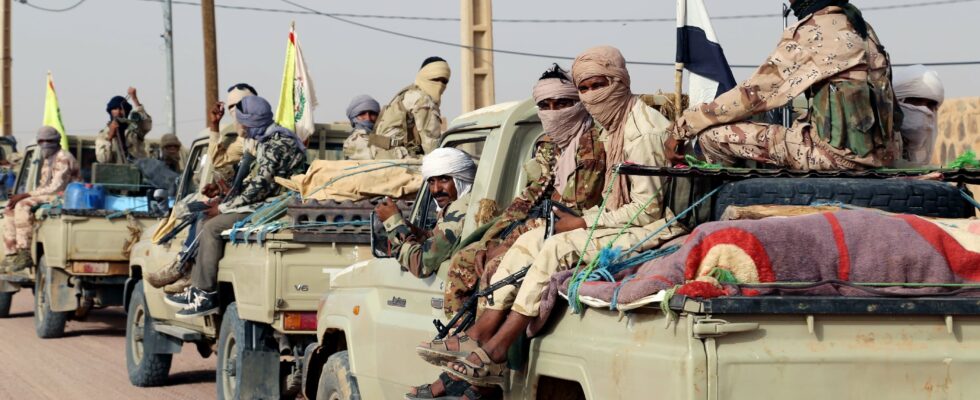Fighting in Mali of unprecedented violence for several months, which turned into a rout for the Malian army and its Russian Wagner supporters. This Sunday, an alliance of armed separatist groups claimed a “resounding victory” in the north of the country. “Our forces definitively annihilated these enemy columns on Saturday. Significant rolling stock and weapons were seized or damaged. The few survivors of the Famas ranks and the (Russian) Wagner militia were taken prisoner,” details a press release signed by Mohamed Elmaouloud Ramadane, spokesperson for this alliance of predominantly Tuareg groups (CSP-DPA).
Clashes broke out on Thursday, July 25 between the Malian army and separatists in the town of Tinzaouatene, while the general staff had announced that it had recently retaken several towns in its mission to recapture the territory. On the side of the armed forces of Azawad, a northern region whose independence the Tuaregs are demanding, seven soldiers were killed and twelve wounded, the statement said. “The CSP-DPA welcomes this victory won by its men, with images and videos to support this during all these battles.”
An intervention by jihadist forces
In addition to the attack by Tuareg separatists, another actor appears to have played a key role in defeating the Russian and Malian forces: the jihadists of the Group for the Support of Islam and Muslims (GSIM), affiliated with Al-Qaeda. In a separate statement authenticated by SITE, a US NGO specializing in monitoring radical groups, the latter also claimed to have booby-trapped a convoy of the Malian army and their Russian allies from Wagner south of the city of Tinzaouatene. They say they killed 50 Russians and 10 Malians, figures that AFP was unable to confirm.
The Malian junta and Wagner’s forces did not fail to accuse this alliance between jihadist forces and Tuareg separatists. The latter firmly denied the participation of the GSIM, accusing them of wanting to pull the blanket in their favor. “No amalgam or other propaganda subtly hostile to our commitment can rob us of our resounding victory,” they stated in their statement.
“A significant number of losses”
Tuareg separatists or jihadist forces, one thing is certain: the Malian army, supported by Wagner’s forces, has suffered a very heavy defeat. The regular forces of Colonel Assimi Goïta’s junta had already initially claimed that their units had “begun their retrograde movement”, meaning a forced retreat.
Before finally admitting their setback in a more substantiated manner on Monday. “The FAMa unit (Editor’s note: the Malian armed forces) was surrounded by the coalition of terrorist forces from the Sahel and violent fighting began before the arrival of reinforcements. The bravery and exemplary determination of our soldiers did not prevent a significant number of losses in human life and material,” declared the army general staff in its press release read on national television, without giving figures.
The general staff reported that they initially inflicted heavy losses on the “terrorists”, before the weather conditions came to “strongly influence the situation”. A sandstorm is said to have slowed the progress of the regular Malian forces, and given the rebels the opportunity to reform their ranks and regain the upper hand. “The FAMas fully and responsibly take the measure of this event and are currently conducting a detailed analysis of the events to draw all the necessary lessons and readjust their security and stabilization strategy”, according to their press release. They affirm that this “situation cannot call into question the dynamics of exercising the authority of the State over the entire national territory”.
What future for Wagner in Mali?
On the Russian side, the story of this defeat is relatively similar. The Telegram channel “Razgrouzka Wagnera”, associated with the Wagner militia, published a statement on Monday attributed to the paramilitary group. This was picked up by official Russian media, such as the state agency Tass, without it being possible to confirm its authenticity.
“From July 22 to 27, 2024, the FAMa soldiers and the fighters of the 13th assault group of Wagner […] “The militants fought fierce battles with militants from the Coordination of Azawad Movements (CMA) and the terrorist group banned in Russia ‘Al-Qaeda in the Sahel’ (JNIM),” the statement said, specifying that Wagner’s fighters were commanded by a certain Sergei Shevchenko, codenamed “Proud”. “On the first day, Proud’s group eliminated a large part of the Islamists and caused the others to flee. However, a sandstorm occurred and allowed the radicals to regroup and increase their numbers to 1,000 people,” the statement continued.
On Friday, July 26 and Saturday, July 27, “the radicals increased the number of massive attacks using heavy weapons, drones and car bombs, which led to losses among Wagner and FAMa soldiers,” the statement said. “The last radio message from Proud’s group was received on July 27 at 17:10: ‘There are only three of us left, we continue to fight.’ The commander of the 13th Assault Group, Sergei ‘Proud’ Shevchenko, was killed in action,” the message concluded. Several sources close to Russian military circles also announced the death of the creator of the Grey Zone Telegram channel, which disseminates information about the actions of Russian mercenaries around the world and is followed by more than 550,000 people.
This defeat is not anecdotal. Having arrived in Mali since 2021 to supplant the French and European armed forces driven out by Assimi Goïta’s military junta, this rout demonstrates a certain inability of Wagner’s Russian forces to carry out large-scale operations in the north of the country. “This is really important. This is the first time this has happened on African soil and it will change the dynamic,” explained Wassim Nasr, a journalist and specialist in jihadist movements with the American news agency AP. “They (Wagner) will no longer send expeditions like this near the border with Algeria. They have boasted about their success and their strength, but they do not have the necessary personnel to do this for long, or to hold the territory in order to secure the deployments.”
